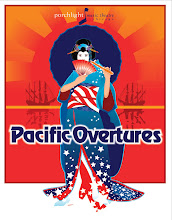
Creating a rehearsal plan (or schedule) is highly traumatic. We survey everyone's availability and then realize that no one is available for any rehearsals! Eventually we come up with a plan of days and times that work for most people.
As the majority of the cast and crew have day jobs (welcome to the theatre), rehearsals are typically weekday evenings and weekend daytime. Most everyone works a full 8 hour day (or more), skip dinner and come directly to rehearsal. We can skip feeding our bodies, and opt instead to feed our souls. We are doomed to a life "of booze, pills and heavy meals late at night."
For Pacific Overtures, we will begin with a concentration on music. Once that is covered we will start at the beginning of the play and work through each scene/song. Every few days we review what we have accomplished so far. We have a few complicated dance numbers, so we try to learn these early in the process to allow us time to get it in their bodies.
A typical rehearsal begins with a vocal and physical warm up. We have an Asian movement specialist who will be leading us in a daily movement workshop. After we warm up, we read/sing through the material for that evening. We spend some time talking about the material and eventually get on our feet to start exploring the staging.
It is a collaboration. We have a lot of directors, musical, staging, dancing and acting, who work together in support of the material. We work though moments of the show and review/revise them; always searching for the best, most impactful, storytelling.
This particular week is all about the music. Our musical director, Eugene Dizon works with the actors to shape the sound of the show. He is very careful to balance the storytelling with the musicianship. Fortunately, our composer Stephen Sondheim was very specific in his composition. If you follow the music carefully, the composition will guide the drama.
Sondheim is an actor's dream, but a singer's nightmare. What I mean is that the technical side is very challenging to learn. The music is often dissonant and the rhythms can be very tricky. The words and music are so perfectly matched to the drama of the song, if you sing it exactly as written, the drama is there.
Pacific Overtures was composed for entirely male voices. Our cast features two sensational women. Their voices bring a unique quality to the score that I have never heard before.
Right now the singers are singing against an electronic keyboard (which reproduces some authentic Japanese musical sounds). I can hardly wait until we have the musicians accompany the singers.
As the majority of the cast and crew have day jobs (welcome to the theatre), rehearsals are typically weekday evenings and weekend daytime. Most everyone works a full 8 hour day (or more), skip dinner and come directly to rehearsal. We can skip feeding our bodies, and opt instead to feed our souls. We are doomed to a life "of booze, pills and heavy meals late at night."
For Pacific Overtures, we will begin with a concentration on music. Once that is covered we will start at the beginning of the play and work through each scene/song. Every few days we review what we have accomplished so far. We have a few complicated dance numbers, so we try to learn these early in the process to allow us time to get it in their bodies.
A typical rehearsal begins with a vocal and physical warm up. We have an Asian movement specialist who will be leading us in a daily movement workshop. After we warm up, we read/sing through the material for that evening. We spend some time talking about the material and eventually get on our feet to start exploring the staging.
It is a collaboration. We have a lot of directors, musical, staging, dancing and acting, who work together in support of the material. We work though moments of the show and review/revise them; always searching for the best, most impactful, storytelling.
This particular week is all about the music. Our musical director, Eugene Dizon works with the actors to shape the sound of the show. He is very careful to balance the storytelling with the musicianship. Fortunately, our composer Stephen Sondheim was very specific in his composition. If you follow the music carefully, the composition will guide the drama.
Sondheim is an actor's dream, but a singer's nightmare. What I mean is that the technical side is very challenging to learn. The music is often dissonant and the rhythms can be very tricky. The words and music are so perfectly matched to the drama of the song, if you sing it exactly as written, the drama is there.
Pacific Overtures was composed for entirely male voices. Our cast features two sensational women. Their voices bring a unique quality to the score that I have never heard before.
Right now the singers are singing against an electronic keyboard (which reproduces some authentic Japanese musical sounds). I can hardly wait until we have the musicians accompany the singers.

No comments:
Post a Comment